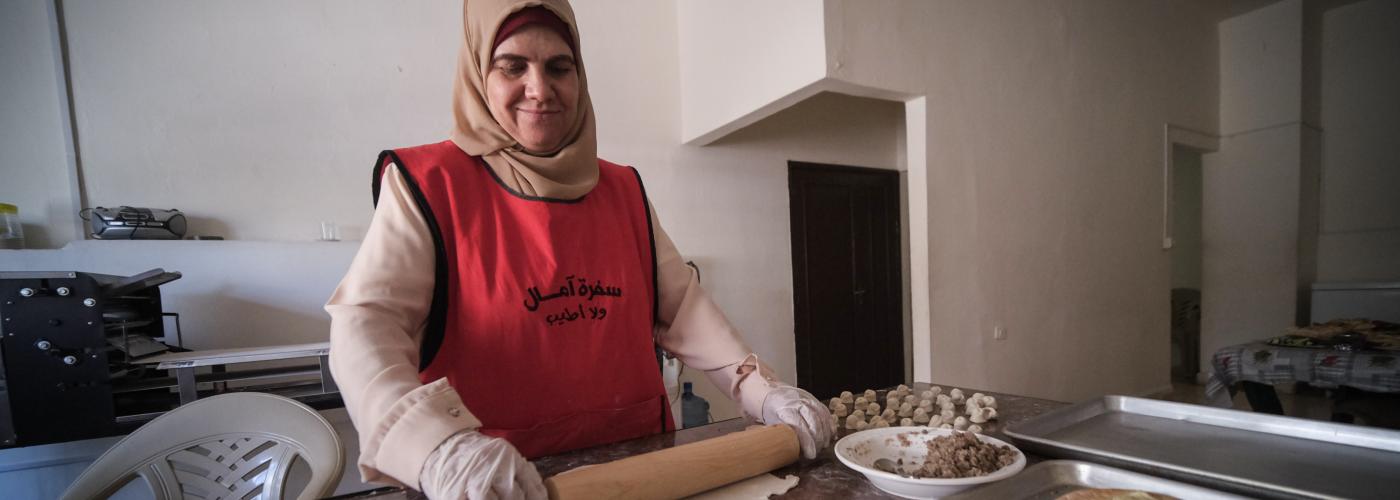In Lebanon, Women Break Barriers to Success
Image

Necessity Breeds Entrepreneurship
“I needed to provide for my children.” It’s a simple reason that motivates millions of parents to earn money every day.
But in Lebanon, where a spiraling economic crisis has left millions of people out of work and put the price of food and fuel out of reach, keeping children fed and in school has become agonizingly difficult. And for Lebanese women — raised to believe that men would be breadwinners and they would be homemakers — having financial pressure unexpectedly thrust upon them can be terrifying.
Through the USAID-funded Expanding Women’s Labor Force in Lebanon project, Lutheran World Relief is helping Lebanese women build their own businesses. Via online modules and one-on-one mentorship, they learn about marketing, finances, how to legally register their business, and more.
None of these women set out to be entrepreneurs. But when traditional family structures, expectations and roles broke down, they rose to the challenge.
Read the inspiring stories of six Lebanese women who turned desperation into opportunity.
Lina
What I do: I make and sell berry juice, tomato paste, kishk [a yogurt/wheat dish] and other traditional foods.
Why I began: I lost my job as a kindergarten teacher when they started requiring a diploma. I was 43 and no one would hire me. My husband was retired. I felt defeated and hopeless.
My oldest son wanted to go to university. He was so excited: he was a good student with good grades. I had one goal: to earn enough money for my son’s first semester at university. He didn’t know we couldn’t afford it. I didn't want him to be concerned about it, so I didn’t tell him.
I thought, “This is a hopeless...but let’s try.”
I was able to collect berries from a neighbor’s land. I made juices. I started looking for books to help my marketing. I took baby steps from the book just to get started. It was something very new.
Challenges I faced: At first, whenever I wanted to buy supplies -- for example, jars or something to put preserves in -- I wanted to sign the invoices. My husband was next to me and the people in the store looked at me as if: “You're a woman and you're not really eligible to sign.” So sometimes I let my husband sign instead of me.
Today, I sign.
How the training helped me: I used to go to one place and market my product there. Because of the training I took, I have widened my vision and I am targeting new places. Another thing that was interesting: you have to think about your product's originality and do something so that it stands out compared to other products.
How I feel about running my own business:It used to be something for my child. When I paid that first university bill, I was so, so happy.
Now it’s something for me myself, and it gives me joy.
Georgette H
What I do: I make pastries and baked goods, plus mouneh (jams or preserves). My vision for the future is a small bakery/cafe that provides organic food.
Why I began: My husband wasn’t providing. He wasn’t focused [during a family tragedy]. Everything was on my shoulders and I needed to stay standing.
Challenges I faced: When I was younger, I wanted to study hospitality. My family’s opinion was that I couldn’t go to Beirut and study hospitality. My response was to stop studying.
How the training helped me: I learned more about marketing. I have regular customers, but I should expand more, through social media.
How I feel about running my own business: The challenges make me move forward.
Amneh
What I do: I sold merchandise at a Dollar Store. Now, because of the economic crisis, I sell products like clothes online via WhatsApp.
Why I began: One of my two sons is disabled. He’s 19 now. He can’t walk or talk. He needs diapers and medication and special food. If I die, there is no one else to take care of him.
Now that I do my business via WhatsApp, I can be at home and take care of him.
I need to provide for him. I don’t want my sons to feel deprived of anything.
How the training helped me: The training was very helpful and gave me a wider scope. The legal advice about how to register was useful, and the training about emotional intelligence. I started looking for products that are in demand, like charcoal for shisha [water pipes]. With the help of the program mentor, I developed a logo and a page on Facebook.
My advice to other women: I encourage other women in the neighborhood to work and not stay at home. Stop waiting for your family to give you money. You need to count on yourself and provide for the children.
A lot of Lebanese women have resilience and strength but need opportunities.
Walla
What I do: I am a hairdresser in people’s homes. I style and color women’s hair. I like the cosmetics world and registered to be a makeup artist.
Why I began: Eight years ago, I separated from my husband. I’m the provider for my two children.
Challenges I faced: I was a top student, but my family doesn’t encourage women to get degrees. My brother said, “Why go study?” and my parents said, “You’ll just end up in the kitchen” -- but I registered [for school] despite that.
People used to tell me, “Just stay home and someone can provide. Someone will give you money.” But at the end of the day, I felt that this money was given to my brother just because he's a boy and I wasn't receiving anything. I had to provide for myself.
Before I married, my husband made me promises that I could go to college and pursue my degree, but they were false promises and I didn't.
He didn’t allow it. He was jealous of other men there.
And all of my friends now have degrees.
Now that I am separated, I need to provide for my children. Whenever you apply for a job, based on my experience, the salary for women is less than the one provided for men, whereas the work done by women is much more.
How the training will help me: I like to learn and to be up to date. Because the program is online, it will help me a lot to do it while the kids are playing games.
The degree that we're offering the through the program is a degree from LAU [Lebanese American University], which is a top-ranked university. I think it's a dream come true.
How I feel about running my own business: These experiences have taught me to stand up for myself.
I have high hopes. I do whatever I can so my children can be educated. I hope my children will be doctors. I like to be strong in front of my children, so they can be strong.
Georgette
What I do: I knit and sell wool products like baby hats, scarves and blankets. I also make preserves and traditional food like kishk (fermented milk-barley food).
Why I began: To be independent. My husband wasn’t supportive and he wasn’t providing. He was sick, and later, he died.
Challenges I faced: There was no support from my family. When I was growing up, my family had the idea that girls should stay at home.
I struggled. At first there was no support. I needed supplies and products.
I was afraid. I didn’t know if I would succeed. I learned how to be bold, how to overcome.
How the training helped me: I was feeling desperate since I wanted to sell kishk, but I didn’t have the needed capital or the resources. After I told my mentor about the problem, she provided me with many potential solutions and several useful suppliers’ numbers.
For me, the online training was better because transportation is so expensive these days.
I used to have an online page, but I did not use it for a long time. I learned how to be more efficient and more active online, how to attract customers online.
Also, if the customer could not afford to pay a certain amount, I used to give them a discount. But now, especially with my program mentor, and also with the help of the courses I took, I feel that I deserve a profit to sustain the business.
My advice to other women: You need to be very strong and hold on and not break.
Ghenwa
What I do: I make and sell candles. I want to own a shop, get more candle molds, and increase my business.
Why I began: Due to the crisis and the currency devaluation, I lost my job in a leather-dyeing factory. There used to be a lot of the factories in Lebanon. Now, they’re doing it cheaper in Syria or China.
I could not find any help. No one would help me. I googled “how to make candles.”
Challenges I faced: The supplies are costly. Everything is priced in US dollars. The high fuel prices affect my business directly – fuel to melt the candle wax or to visit suppliers. I can’t go to several suppliers and compare prices.
Also, women’s rights are not respected here. Whatever the men say, goes.
How the training helped me: I like the marketing module. I learned when to post, how to post original things on social media. I want to sell candles over Facebook.
I hope we get more programs that focus on Lebanese women and empower them. Women are a pillar right now. They need to provide for their families and kids.


